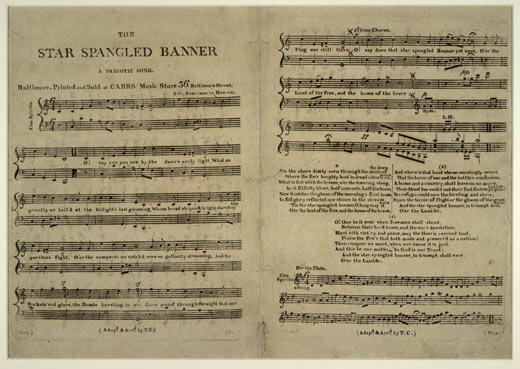當(dāng)前位置: Language Tips> 英語(yǔ)學(xué)習(xí)專(zhuān)欄
分享到
在戰(zhàn)火中,美國(guó)律師弗朗西斯?斯科特?基有感而發(fā),寫(xiě)下動(dòng)人詩(shī)句,后來(lái)成為美國(guó)國(guó)歌《星條旗》(The Star-Spangled Banner)的歌詞。

暢捷 選注
In 1813, the commander of Fort McHenry asked for a flag so big that “the British have no trouble seeing it from a distance.” A woman used 400 yards of fine wool to make the flag. There were eight red and seven white stripes . The stripes were each two feet wide. When it was finished, it measured 30 by 42 feet.
At that time, Francis Scott Key was a lawyer in Georgetown. In 1814, the British captured Washington. President James Madison and his wife had to leave the White House and run to a safer place.
After this attack, the Americans knew that Baltimore would be attacked next. The British had captured Mr. Key’s friend. His name was William Beanes and he was a doctor. Key and another man set out to try to save Dr. Beanes’ life. They told the British the doctor had helped save British soldiers who had been wounded. The British agreed to free him, but they wouldn’t let them leave because the three men had overheard the British making plans to attack. So they were placed under guard on a British ship.
It was from this ship that Francis Scott Key watched the bombing of Fort McHenry. There was a lot of smoke and haze, but when daylight came, he could see the flag was still waving. He was so inspired that he began to write a poem on the back of a letter he had in his pocket. He later finished the poem and showed it to a printer and had copies made of it. Two of these copies survive today.
Newspapers started printing it and people began singing it to a familiar tune. On March 3,1931, The Star-Spangled Banner was adopted as the American anthem.
Vocabulary
1. Fort McHenry: 麥克亨利堡,美國(guó)國(guó)歌的誕生地。它是第二次英美戰(zhàn)爭(zhēng)中重要的海港軍事要地。
2. fine wool: 細(xì)毛。
3. stripe: 條紋。
4. capture: 奪取,占領(lǐng)。
5. Baltimore: 巴爾的摩,是美國(guó)大西洋沿岸重要的海港城市。
6. overhear: 偶然聽(tīng)到,無(wú)意中聽(tīng)到。
7. haze: 煙霧;wave: 飄揚(yáng)。
8. inspire: 賦予靈感,啟迪。
9. anthem: 國(guó)歌,贊歌。
(來(lái)源:英語(yǔ)學(xué)習(xí)雜志 編輯:丹妮)
上一篇 : 我們?yōu)槭裁葱枰仔獱?奧巴馬
下一篇 : 克萊斯勒的另一個(gè)花招
分享到
關(guān)注和訂閱


口語(yǔ)
關(guān)于我們 | 聯(lián)系方式 | 招聘信息
電話(huà):8610-84883645
傳真:8610-84883500
Email: languagetips@chinadaily.com.cn